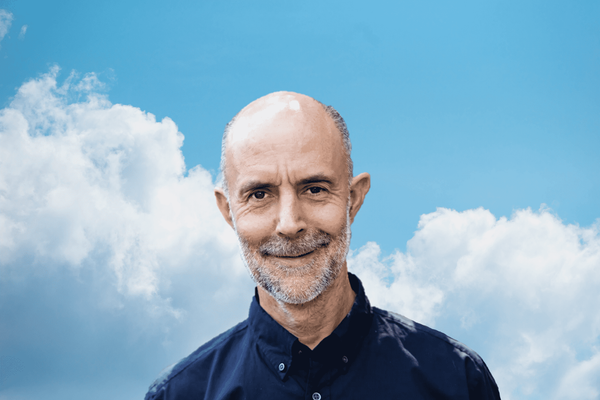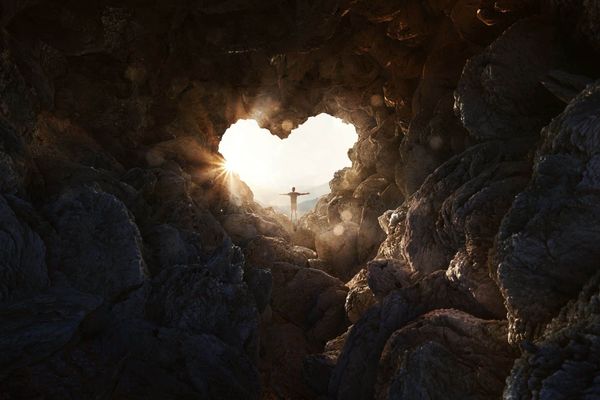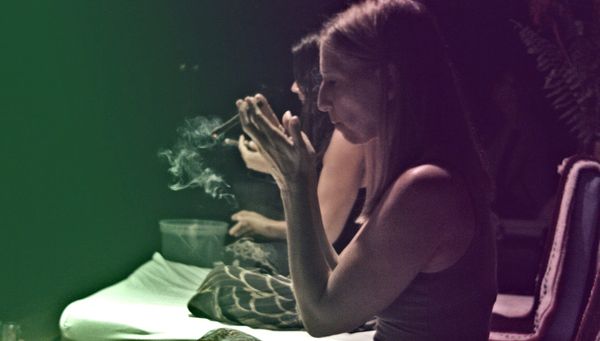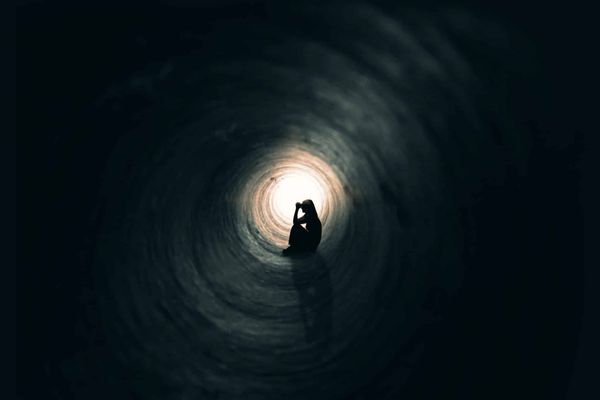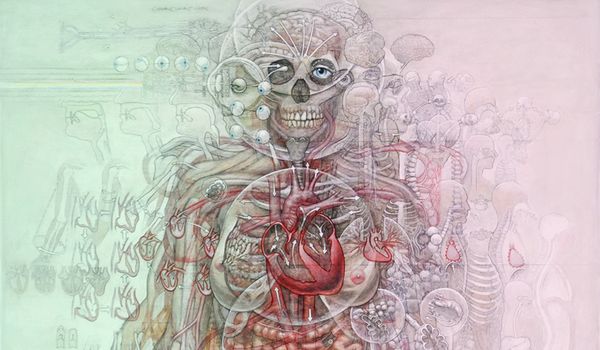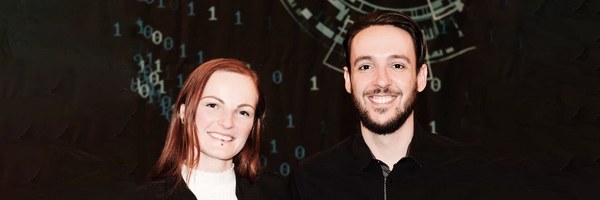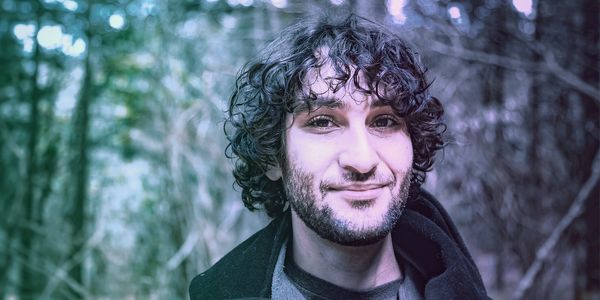Jonathan Toniolo • • 16 min read
Consciousness Hacking: Mikey Siegel on Transformative Tech and the Future of Spirituality
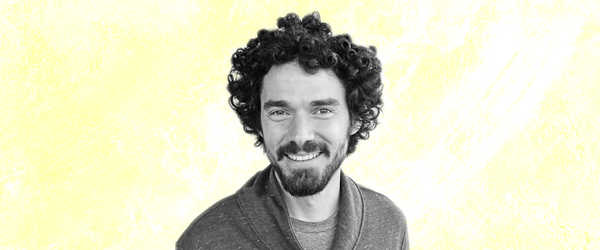
The late Isaac Asimov once said, “The saddest aspect of life right now is that science gathers knowledge faster than society gathers wisdom.”
Given our current global predicament, it’s easy to read his words as nothing but absolute truth. Indeed, it seems modern science has far outpaced our collective capacity for wisdom.
But in what ways could we go about closing this gap?
Well, for Mikey Siegel, a technologist turned seeker, one answer might lie within Asimov’s statement itself: apply the former to the latter. Or more specifically, apply technology to spiritual evolution.
For many of us, fewer areas of life are more disparate than technology and spirituality. Certainly as a matter of practice, the two have traditionally been at odds — you’d be hard pressed to find a monk or priest using gadgetry as a portal to the mystical. Even now, as we use our computers and smartphones to assist us in practically every endeavor in life, their utility often disappears come time for us to channel cosmic consciousness.
But for Siegel, the notion that tech and spirituality are at odds is tragically incomplete, if not entirely misguided. An engineer by trade, Siegel views science and technology as eternal allies in the evolution of consciousness. He believes if we repurposed them wisely, they could offer us an ocean of transformative power, accelerating forms of growth and awakening like never before.
And he’s formed an entire community around this principle: Consciousness Hacking.
Born in the auspicious city of San Francisco, the group has now reached over 10,000 members and is a thriving, global community. Collectively, they’re hoping to find some kind of Moore’s law for societal wisdom, wielding a vision of spirituality not much different than that of astronomer and cosmologist Carl Sagan, who famously said, “Science is not only compatible with spirituality, it is a profound source of spirituality.”
I had the chance to chat with Mikey and explore the ins and outs of his vision, and whether our science and technology will indeed align with the future of spirituality.
*This transcript has been edited for the sake of clarity and brevity.*
So tell me a little bit about your background and how you got interested in exploring consciousness.
My background is really that of an engineer who’s always been interested in the esoteric and the mystical. I grew up taking stuff apart and wanting to know how things worked. I always had an engineer’s mind. I also always had this sense that there was something more, something behind the veil of the world as it was presented to me. But I ended up going down the engineer’s path. I did my undergraduate work in computer engineering and studied robotics in grad school.
After graduate school, fueled largely by a kind of deep existential angst, a sense of disconnection and anxiety and not knowing why the hell I was here, I ended up in a yoga ashram in Virginia. And that was my first taste to a more experiential approach to the inner world. I realized that there was this whole dimension to my life that I had been missing. From an engineer’s perspective, I realized I had been missing half of the equation. I had been focused on the outer world, building and tinkering, exploring science and technology, but gave little attention to my inner world. And at that point I was hooked.
As I went deeper and deeper down that rabbit hole — exploring different meditation techniques, psychedelics, traveling to India — I was also still holding a certain tension. Because on the one hand, I had this deep interest in engineering, and on the other a deep spiritual yearning, and I felt the need to reconcile the two. Since then, learning to dance between them has been my life’s path.
And through that dance you founded Consciousness Hacking as a way to explore that further…
Yeah. Through exploring this relationship between technology and transformation, I started to see so much possibility there. This massive, open frontier. So I started to look for other people who were on that frontier. And I could find a person here and there, but these connections were generally disparate. There was no community. There was no web. No network. And so Consciousness Hacking was really my effort to try and create that community.
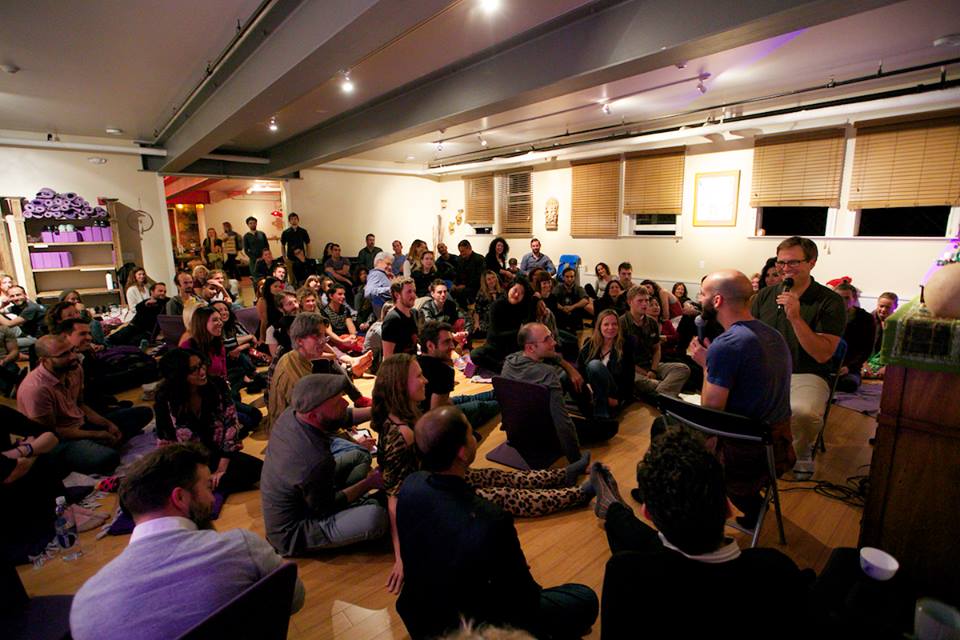
So as a community, what do you actually do? What’s presented at meetups and what kinds of tools do you explore?
Well it’s important to note that the community seems to differ a bit from city to city and country to country, so there’s a lot of different things happening depending on where you’re at. But you could say that part of a general underlying theme — my sense of it, at least — is the recognition that there’s an incredible human potential. And I mean that broadly. Because there isn’t a spiritual tradition or a guru or a particular notion of awakening or enlightenment that we follow as a community. But broadly speaking, almost everyone has some kind of spiritual or contemplative practice. And there’s a recognition that, collectively, we’re only scratching the surface of what we can be, and that, additionally, science and technology can and should be supporting us in realizing that potential.
And so we come together as a community to explore that. We have speakers give talks and showcase technologies revolving around that theme in some way. We have small group discussions, where people can talk about ideas more in-depth. We have some networking and people connecting with each other and finding their tribe.
But then we’ve expanded beyond that, in the Bay Area at least, because there’s a sense that the relationship between who we are and what we build needs more attention. In other words, if we want to be able to build transformative technologies, it’s important for us to shift the place from which we’re building.
Essentially looking at how your intention and state of being influences what you’re building…
Exactly. For example, you look at all these concerns around AI, and the first question I think to ask is not about “What will the AI be?”, but rather “Who’s building the AI?”
What are their intentions? What are their hidden biases? What are their fears? What are they blindly (or consciously) building into the technology that could be grounded in ignorance or pain or suffering — whatever kind of psycho-emotional baggage we all have? I think there’s now an incredible responsibility on the part of people who are building these technologies to actually deal with their shit. If you don’t, it’s going to be baked right into the technology you’re creating.
So we’ve added other types of events that are more focused on addressing the foundation of our being. We have facilitated meditations that we do together, explore different modalities of healing together, that kind of stuff.
One of the things I find interesting here is that you have people from different spiritual backgrounds, with their own cultural biases and practices, their own notions of awakening, all converging into this new technology space. Do you think these technologies can be a way of overcoming tension between spiritual dogmas?
When you look around and consider the world, think about what human systems are universally accessible. It’s not language, right — we have different languages from country to country. It’s not food — we don’t necessarily like each other’s food. It’s not music. It’s not political systems. It’s not religious systems. Very few systems are actually universal from culture to culture and place to place.
But over 90% of the world’s population has an active cell phone account. There’s something about technology, in its modern form, that can transcend all cultural, religious, and geographical barriers. It doesn’t have the limiting qualities of language-based systems or spiritual or religious systems — which, yes, can be incredibly polarizing. And so if we can find a way to make really skillful transformative tools as available and as accessible as cellphones, then we could actually — and in a very short amount of time — be supporting potentially profound, widespread shifts in human consciousness.
Right, because they might not be as triggering as, say, psychedelics or yoga would be to certain people…
Yeah, I tried to get my parents to meditate for years and they didn’t have any interest until one day, I bought them a Muse EEG Headband and all of the sudden they’re totally happy to meditate. And they don’t even consider it meditation. They’re just putting on this band, plugging it into their phone, and then they’re getting a kind of technology-supported meditation experience. But the tech makes it accessible.
One of the classes I’m teaching at Stanford right now is called “Technology Augmented Meditation” where the students use a different technology every week in conjunction with their meditation practice. I think we have about 12 or 13 technologies that are available to the students, including a Heart Math device, which measures your heart rate variability and helps to regulate your breathing and find a physiologically balanced state. It includes Thync, which is a device that runs a small electrical current through your brain — which is interesting. It includes apps that have guided meditation. There’s a whole bunch of different stuff.

And this is just the beginning. We’re essentially in the stone-age of these kinds of technologies, compared to what is possible. We’ve spent 3,000 years or more developing what I would call traditional contemplative tools — meditation techniques, breathing techniques, yogic techniques, these types of things. And those have an incredibly rich, unbelievably deep heritage. Just thousands and thousands of volumes on different spiritual practices. But they were developed largely for a specific cultural context. And the development of that same intention into a broader, technological cultural context is just beginning.
Interesting. Yeah, I remember hearing somewhere that, at the moment, you personally don’t consider these technologies to be a core part of your spiritual practice.
The technology is really great right now as a bridge. There are a lot of people that just wouldn’t know how to get started with meditation unless they had an app that they could use to give them some initial guidance. And perhaps after using that app for 6 months or something, there may be a next step they take to deepen their practice, which maybe has nothing to do with a modern technology.
But as the technology progresses, it will continue to be able to support deeper and deeper practice and increasingly advanced stages of development. We’ll be able to provide different types of support — everything from healing to awakening to psychological development.
Do you think there’s a higher risk involved with using these technologies, as opposed to more traditional means of spiritual development? What would you say to people who worry that this is just a more sophisticated form of “happiness-in-a-pill”?
So we all have a deeply ingrained predisposition to avoid pain and seek pleasure. From a Buddhist perspective, that’s essentially the cause of our suffering. But it’s basically a rejection of our present moment experience. And we’ll do that in a variety of ways. From overeating, to abusing pharmaceuticals, to you-name-it. And technology is no exception. There will be technology that is perpetuating our habit of avoiding, repressing and being in conflict with our own experience, and there will also be technology designed with a different intention, coming from a place of wisdom, designed specifically to help bring us back to our present moment experience. But also, no matter what the technology is or how it’s designed, it can still be misused. And the same is true even with a meditation technique.
So I’m not talking about a panacea. These tools won’t be a solution to every problem we’ve ever had. And the risk and reward will go hand-in-hand. These technologies will become more accessible, more powerful, and their effect will work under much shorter time-scales. They’ll offer incredible advantages, but will have equal risk accompanying those advantages.
But it’s important to emphasize that these concerns — questions about dependency on technology, “shortcuts”, the “authenticity” of the method, etc. — are not only valid concerns, but not a single one of them are new. Every single concern still applies to traditional techniques. You can be dependent on your Samatha practice. You can think of that as a shortcut. Is it a shortcut to have a technique at all? Should we just not use techniques because of this?
Right, of course not…
So we should approach these technologies with more or less (depending on the technology) the same caution and reverence we would with any other spiritual technique.
I heard Ken Wilber recently joined your advisory team, which is great news. I was at his meetup a few months ago and remember him talking about structures of consciousness v.s. states of consciousness. Could you elaborate a bit more on what he was contrasting?
Yeah. So, for thousands of years, spiritual traditions have focused on what in this context is being called states of consciousness. For example, the difference between sleeping and being awake is a pretty clear distinction in states of consciousness that we’re all familiar with. And in nearly every contemplative tradition, there are certain states of consciousness that are intentionally cultivated through various techniques and practices. Awakening, enlightenment, samadhi, satori, non-dual… there’s lots of different names for these states — and traditions get very detailed in how they characterize them.
But what Wilber is suggesting, which I certainly subscribe to, is that all of these states are happening within a container of a specific worldview — sort of like the basic truths or assumptions that we live by — and that often that worldview goes unquestioned.
You could have an Islamic extremist, for example, with extremely violent tendencies and a deeply ingrained sense of hatred towards infidels, and a strong sense of rightness towards their own ingroup; they have a particular framing — which applies to many religious groups — around this clear sense of good and evil. My group being right, your group being wrong. But it could also be possible for that individual, through their deep devotion to God and the practices that they engage in, to actually be at a very elevated state of consciousness.
And so the problem is how that state of consciousness gets cast into a morality system, into a worldview, that’s ultimately not conducive to human flourishing…
I would say it’s not conducive to the type of world that I would want to live in. There’s a sense that there is an evolutionary arc to structural development — to the development of our worldview. This is generally summarized as moving from “ego-centric” structures, to “ethno-centric” structures, to “world-centric” structures — essentially increasing the number of perspectives you can take in. And so as you move along that evolutionary arc, it’s increasingly conducive to peaceful coexistence. And that arc can be, in certain ways, independent of the arc of our development of states of consciousness.
Right, so basically we need a co-evolution of both states and structures of consciousness…
Wilber’s thesis is that many religious and spiritual traditions have never developed structures of consciousness because they’ve been largely invisible and tied to dogmatism. Developmentally speaking, they’ve only looked at states of consciousness. And the possibility that exists now, particularly with the support of technology, is to actually include both structures and states into our spiritual development. We should be careful not to make the same mistake as these traditions in ignoring structures of consciousness and the biases and ideologies they entail.
Could you give an example of a transformative technology working in an interpersonal context?
Yeah, that’s a really big focus of mine. I’ve been developing various versions of interpersonal or relational technologies for a number of years now. My most recent project looks to bring a group of up to 24 people into a kind of state which we could call “group flow”. The way it works is by taking these sensors and monitoring every person’s heart rate variability, and then bringing that data into a centralized computer. Then you look at the kind of “collective rhythm” of the group, which is then fed back to the group in the form of sound. There’s an emerging science which suggests that, as people become more connected, it actually shows up in the body as patterns that can be measured.
So in this experiment, when the group is more in sync, the sounds reflect that cohesion?
We have a lot of different modalities that we’ve been playing with, and it includes that, where the system responds in real-time to that collective rhythm. There’s a kind of white-noise that emerges when the group rhythm is disjointed and incoherent, and a more rhythmic sound-space as the group gets more in sync. And so everyone is actually able to hear the degree to which their bodies are harmonizing. There are other ways of doing it as well, but that’s just one example.
That’s awesome. I think that project is really relevant to our time.
Yeah, it’s something I’m really passionate about. Because right now, our technology landscape doesn’t really support healthy, deep and meaningful human connection. And don’t get me wrong, what we have is really incredible. We have you and I, right now, talking over video. We have billions of people on Facebook, sharing information and connecting in these ways, and it’s amazing. It’s a step in the direction of human connection.
But at the same time, it’s missing some really important stuff. People are more and more connected than ever, digitally speaking, but we’re also lonelier than ever. And my concern is that if we don’t start thinking about how our technology landscape can actually be supportive of deep and healthy human connection, a felt sense of connection, then we’re going to be digging ourselves into a very deep hole. A very lonely, disconnected hole.
I agree, and I think that’s one of the reasons I find your work so important. Because, like you said, we’re already immersed in technology on a daily basis. It’s everywhere. But it’s also enabling us to ignore things that are necessary for us to thrive. And we need new ways of addressing that besides just turning into Luddites.
As I see it, the goal is not to increase the amount of technology. For me, the goal is to ensure that our human systems — our technological, financial, educational, political systems — are built from the heart, from a place of wisdom, with the intention to support the health, the healing, the well-being, and ultimately the flourishing of humanity.
And right now, that’s not the case. Right now, our technology is mostly built with a profit motive as the central, motivating force. You can see how well that’s worked out in the food industry, for example. We have a food industry that is literally killing us. If you look at the top causes of death in the U.S., a large number of them are diet related. By and large, our food industry isn’t designed to make us healthy and nourish us. It’s designed to create food which is expertly crafted to trigger basic human addiction tendencies in order to sell more food.
And the same thing is emerging in the technology industry. Just look at the apps on your phone. A lot of them are the equivalent of junk food. But instead of being designed for your taste buds, they’re designed to hold your attention.
Right, but that makes me think back to the root of why we’ve designed these systems this way — and maybe this ties into what Wilber was talking about — and I think it stems from fundamental assumptions about who we are as humans and what our purpose is. And that if you change those assumptions, you’ll change the way we design systems…
There’s a quote that I love from the United Nations — from the UNESCO constitution — and it says, “Since wars begin in the minds of men, it’s in the minds of men that the defences of peace must be constructed.” It’s a very clear recognition that real change needs to happen from the inside out. And that doesn’t mean that we should stop all the efforts we have in putting out the countless fires in our world — you know, the wars, the famines, the genocides, the harmful inequalities. But putting out the fire, in this case, won’t stop the root cause of the fire.
Everything we’re creating in the world is a reflection of who and what we are. So the responsibility on the part of all of us creating and building humanity, which really every single one of us is doing, is to recognize that we’re creating this. And that before we can make any significant change in the external world, we have to change ourselves first. By doing the work and dealing with our shit. Or as Wilber would say, “waking up, growing up, and cleaning up.”
Amen. I think that’s a great note to end on. Thanks for your time, Mikey.
Further Reflection:
If you’re looking for more info on Consciousness Hacking or want to get involved in any way, be sure to check out their site and/or one of their many regional meetups (or start one yourself if their current locations are too far from you). And for a more critical perspective on the ethics of consciousness hacking, check out this important piece from Neurohacker Collective.
I also want to expand a bit on our final responses:
As Gabor Mate once put it, “Before we create the world, the world creates us.” Much like a puppeteer, the world shaped our formative experiences into all sorts of mental and emotional configurations. Assumptions about who we are, how we should act, and what we think is possible, all stem from these experiences. And as some of us are now painfully aware, there were many systemic and cultural problems with our world that limited and/or shaped experiences for the worst — problems which manifested into such vast areas of life that we can no longer privatize faults with any kind of certainty (the homeless man can no longer be easily dismissed as having made poor life choices.)
It’s a progressively messy, ever-changing feedback loop: Our world shapes us, then we shape our world, which then shapes us back again, and on and on it goes. However, given the current influence of technology and its increasing accessibility, I think we carry a greater responsibility to become more intentional with this process, directing it away from harmful mutations and towards a wise and nourishing future.
Indeed, the way we’ve come to experience life may not be our fault. But, insofar as we have the resources available to us, it’s certainly our responsibility to change it. And as Mikey suggested, unless we reconcile our leftover conditioning, assumptions, and pain from the world which created us (granted, this is no small feat), those things will inevitably be projected into whatever new world we’re trying to create. New systems can’t reinforce better outcomes if we’re stuck in old ways of being. In other words, we need to “clean up”. And as we do, whatever fertile ground is left, whatever empty space remains, is where we construct the defenses of peace.
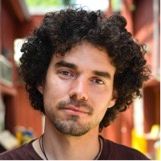
Mikey Siegel studied computer science at UCLA and robotics at MIT. He’s worked for NASA at the Ames Research Center in Moffett Field, CA in the Intelligent Robotics Group, founded Consciousness Hacking, and co-founded the annual Transformative Technology Conference held in Palo Alto. He’s currently an adjunct professor at Stanford University.
Further Study: Integral Meditation: Mindfulness as a Way to Wake Up, Grow Up, and Show Up in Your Life by Ken Wilber
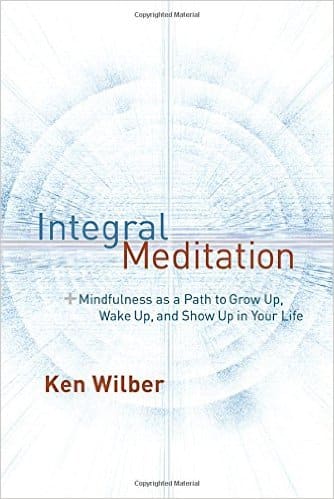
As Mikey explained, Ken Wilber’s important work focuses not only on experiencing progressively more expansive states of consciousness, but also structures of consciousness. Not only is it important that humanity strives collectively to cultivate enlightened states; it is equally or more important that we progress from the ego-centric, to ethno-centric, to world-centric, and ultimately to what Wilber calls the “Kosmos-centric” stage of development, and beyond. Not only do we need to wake up; we also need to grow up. In this spectacular and accessible guide, Wilber explains his framework in plain English and describes how to use mindfulness meditation to accelerate your spiritual development.

